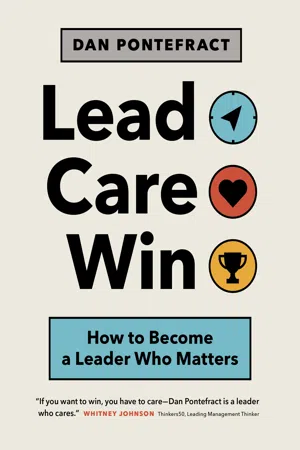![]()
Be Relatable
Look around. What do you see?
If you’re like me, you see a world desperately in need of your help. It matters not if it’s at work, home, on holiday or at the park. People everywhere—across all walks of life—are yearning for a stronger form of humanity to step forward. The SARS-CoV-2 (coronavirus) pandemic of 2020 clearly illustrated this need. How we care about and treat others is in need of an inquest.
Now ask yourself this question. When was the last time you had an honest exchange with another person, one that was so moving it might have even changed your life (let alone theirs)? Throughout the following pages we are going to talk about this great divide, outlining how and why it happens in the workplace and elsewhere. The problems are candid, but the corrective lessons are succinct and easily applied.
While we often hear the mantra that leaders are in the people business, something continues to be lost in translation. Let me make it clear: you are in the relationship business. Your number one and irrefutable goal is to focus your leadership on the development and sustainability of relationships. They could be with your family, neighbors, team members, bosses, partners, customers, suppliers or even competitors. The entirety of Lead. Care. Win. focuses on your exchanges with people and how to make them more meaningful and mutually productive.
The first lesson in this book centers on relatability. Just how relatable you are in all of your relationships—be they at work or outside of it—is a hallmark of leadership. I went looking for a story to help introduce the concept in this opening lesson. That story came to me on the day I was delivering a live webinar to an audience during the spring of 2019. In the middle of the session it serendipitously dawned on me: “How the heck did Zoom get to be so popular and why do so many people love it?”
Zoom is an online collaboration tool that allows you to host video meetings and conversations from any device. It was founded in 2011. Zoom was the service I used during that webinar session. By the time the pandemic hit, the use of Zoom skyrocketed from ten million daily users to well over two hundred million. The tool includes chat systems, screen sharing, document exchange, and a host of other features. On April 18, 2019, the company went public on NASDAQ and was valued at just under $16 billion by the end of its IPO. As of this writing it’s up well over 200 percent with a market capitalization greater than $50 billion.
The last thing I wanted to do in a book about a more caring form of leadership was to highlight another high-tech company from Silicon Valley. Many stories from that part of the world are not to my liking. But as I researched Zoom to quench my curiosity, I became much intrigued. I reached out to its founder, Eric Yuan. He responded the very day I sent him an introduction and said yes to my request for an interview. Naturally, we used Zoom.
“Dan, we are here to make people’s lives better. Love is everything. If you truly love a customer or employee or partner, you will do whatever you can for them.” These were not the first words I was expecting to hear from the founder and CEO of an online collaboration tool based in Silicon Valley. But they were powerful words, and a clear example of Yuan’s view that the more relatable you are, the better things will be. It was a perfect start to a conversation about leadership.
His energy and passion regarding relationships shot through his office webcam, so much so I thought I was face to face with him for the duration of our time together. “When I was a kid, I never thought about it,” he said. “I was taught to be very kind to people by my parents. Now, at Zoom, we know that if an employee is not happy, the customer will not be happy. It’s all about relationships.”
Happiness, love and looking out for others are key traits to Yuan’s relatability style. Evidently it’s working. Customer satisfaction is off the charts. The company’s net promoter score—a loyalty metric that measures a customer’s willingness to return for another purchase and likelihood of recommending the company to family, friends or colleagues—is 62. Scores higher than zero are typically considered to be good, while scores above 50 are excellent. Anything below zero is a negative experience. For comparison, eBay’s NPS score is 9, Costco’s is 79 and Facebook’s is pegged at minus 21.
Not everything has been rosy. During the pandemic, Zoom came under public fire for several security and privacy issues, particularly related to its Free Basic and Single Pro licenses. Zoom was originally intended to be an enterprise customer product, but with so many organizations switching to online meetings and classroom learning via Zoom, issues began to crop up. For example, some malevolent users began “Zoombombing,” disrupting Zoom meetings uninvited and sharing shocking or even pornographic content due to a lack of passwords and easy access to the Zoom rooms. Yuan quickly stepped up, accepting blame, apologizing and immediately committing to fix any of the issues. In a blog post in early April, 2020, Yuan wrote:
Transparency has always been a core part of our culture. I am committed to being open and honest with you about areas where we are strengthening our platform and areas where users can take steps of their own to best use and protect themselves on the platform.
We welcome your continued questions and encourage you to provide us with feedback – our chief concern, now and always, is making users happy and ensuring that the safety, privacy, and security of our platform is worthy of the trust you all have put in us.
It’s what a caring leader ought to do in any sort of crisis. Be open and transparent, and look out for those you serve. It’s the very definition of being relatable.
But how did Zoom come to be? Why did it become so popular? And why are its two thousand employees so happy at work?
After emigrating from China, Yuan joined an antecedent to Zoom in 1997 as a young engineer. The company name was Webex. During the dot-com bubble mania, the company went public. A few years later, it was acquired by telecommunications giant Cisco for $3.2 billion. By 2010, Yuan questioned his happiness. Cisco was unwilling to invest in a complete rebuild in Webex, something Yuan was pushing for. He saw how slow and unfriendly the Webex experience had become for users. He no longer felt he was relating to the customers, let alone the company he worked for. Yuan was in charge of eight hundred engineers. What to do?
According to Yuan, Cisco didn’t care about the customer’s video conferencing experience. It wasn’t interested in relating to the customer’s needs. Cisco was more focused on building an enterprise version of Facebook. Further, the culture at Cisco had become too much for Yuan. “Every day, I was going into the office and I was very unhappy,” he said. “And so were my customers. It was a negative impact to me and everyone.” Yuan left in 2011 and immediately started work on Zoom. The rest, as they say, is history.
“Our company has a culture of delivering happiness,” Yuan said. “Our company values are but one word: care. We care about each other, our customers, the community, Zoom, and ourselves. If you don’t care, then you come across as always being right. And I’m not always right. Be humble, admit mistakes. And don’t be so arrogant. We’re only human.”
I could have chatted with Eric Yuan for hours. A mere sixty minutes, however, provided rare insights into someone who believes that if you are relatable, everyone can win. He may be a multi-billionaire—and operating out of Silicon Valley—but Yuan built his successful career by caring, admitting mistakes and acting with humility, all the while looking out for others throughout the journey. In a nutshell, lead, care, and then you will win.
The Problem
New York Times columnist Paul Krugman once suggested that the United States is a nation suffering from an “epidemic of infallibility.” I share his sentiment, to a point. It’s not just infallibility, and it’s not a malady exclusive to America. It’s our misunderstanding of the importance of relatability. We may think we’re infallible, but that often boils down to our unwillingness to accept that we make mistakes ...

